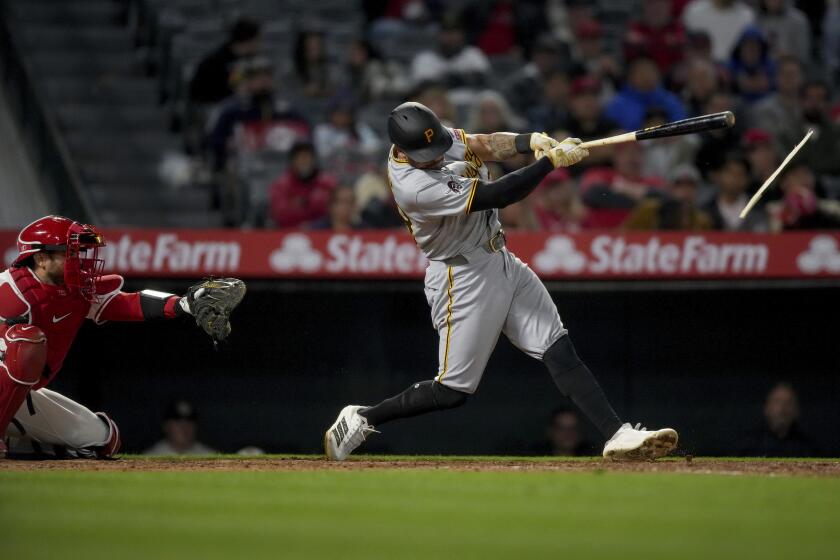The Dodgers Once Dodged the Trolleys
- Share via
I know this subject is more suited to the sports pages, but some time ago I asked, in print, where the Los Angeles Dodgers got their nickname.
I have received an answer not only from Peter O’Malley, owner of the Dodgers, but also from Linda M. Wagner, director of public relations for the Brooklyn Historical Society.
The story is so quaint that I think it is worth telling here, even if every reader of this space is not a Dodger fan or even a baseball fan.
It is hard to believe that any Angeleno could not be aware of the Dodgers after the glorious conclusion to the 1988 season, when they beat first the New York Mets and then the Oakland A’s to become World Champions.
However, this is a cosmopolitan city, and, as Herb Caen found out when he flew down here for the final Met game, there were some Angelenos who didn’t even know the game was going on.
“I wish I could say that World Series fever is sweeping the city,” he wrote later in the San Francisco Chronicle, “but Lozangeles is too big for anything to sweep it. Not a single cabbie I spoke to was aware of the Series, but they were either Romanian, Persian, Costa Rican or actors between jobs. ‘I realize,’ said a Yugoslavian driver named Branko Tesie, ‘that is very difficult to hit round object with round stick, but is too boring to watch. Soccer football better.’ ”
To go back, there were at least nine Brooklyn neighborhood teams in the loosely knit baseball federation of 1857. It was in that year that Henry Chadwick, a zealous sportswriter for the Brooklyn Eagle, invented the box score and wrote the first rules book. (Baseball would never have become what it is today without sportswriters.)
In the 1880s there were three leagues pretending to be major; Brooklyn belonged first to the Interstate League, then to the American Assn. It was in this era that the press first began calling them the “Trolley Dodgers.”
Brooklyn at that time was composed of a number of Dutch villages linked by a complicated and rather dangerous horse-drawn trolley system. New Yorkers, supercilious as always, began referring to Brooklynites as “Trolley Dodgers,” and in time the name was applied to the team. Over the years the “Trolley” was dropped and they became the Dodgers.
In the meanwhile, though, the Eagle had tried to popularize the name “Superbas,” after a vaudeville act called “Hanion’s Superbas.” Later, when Wilbert Robinson briefly became the team’s manager, the Eagle switched to “Robins.” Robinson’s successor asked Brooklyn’s baseball writers to choose a name, and they chose Dodgers.
For one mad year, however, that name was set aside. In 1889 six Brooklyn players got married at about the same time. Newspapers coyly referred to the team as the “Bridegrooms,” but that honeymoon lasted only for one season. In 1890 Brooklyn joined the National League as the Dodgers.
It was in the Depression era that a loudmouthed fan seated safely behind the home plate screen vociferously expressed his disdain for individual Dodger players. “Ya bum, ya!” he would shout. Baseball writer Sid Mercer was amused by the man, and called him “The Spirit of Brooklyn.” One day when he was particularly disgusted by the team’s performance, the fan yelled, “Yez bums, yez!’ and Mercer noted in his story: “The singular spirit of Brooklyn lapsed into the plural yesterday.”
Soon everybody began calling the team Bums. The name almost replaced Dodgers. After all, Bums was easy to fit into a headline. Even Walter O’Malley, when he bought the team, smiled on the nickname. “Sometimes,” he said, “I think we have a tendency to take ourselves too seriously.”
Even when the team moved to Los Angeles, in 1958, the sleazy epithet clung to it. But when the Dodgers moved into their palatial new stadium at Chavez Ravine in 1962 it no longer seemed to fit. One rarely hears it any more, even when the team bombs.
As Ms. Wagner of the Brooklyn Historical Society assured me: “No one can deny the financial success that accompanied Walter O’Malley’s transplanting the Dodgers from this town to yours. But as a symbol that touched the hearts of millions, ‘Dem Bums’ belong to Brooklyn.”
By the way, Brooklyn’s Historical Museum is scheduled to open this fall.
More to Read
Go beyond the scoreboard
Get the latest on L.A.'s teams in the daily Sports Report newsletter.
You may occasionally receive promotional content from the Los Angeles Times.










